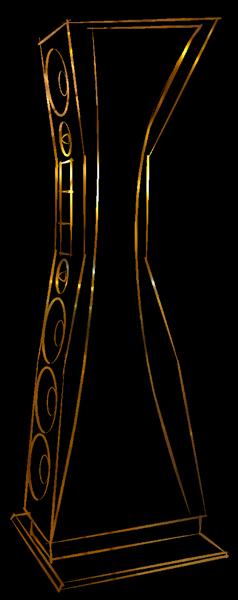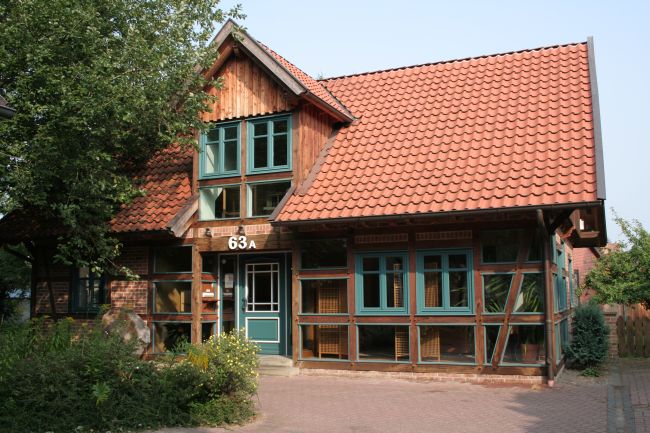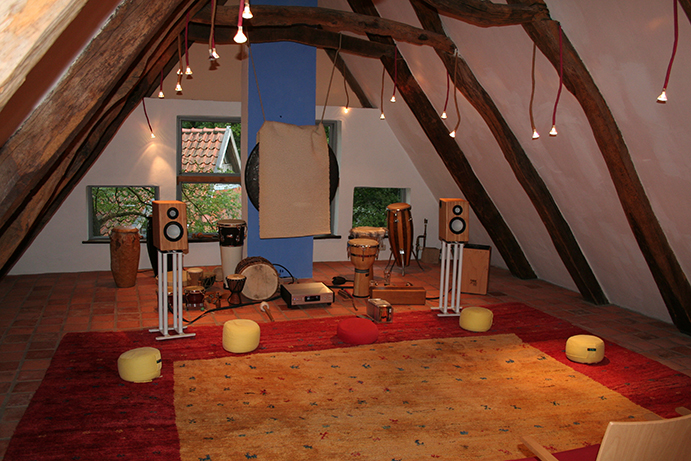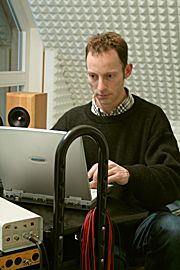Difference between revisions of "Myro"
Wonneproppen (talk | contribs) (→Dynamic Measurement) |
m (→Geschichte) |
||
| (32 intermediate revisions by 20 users not shown) | |||
| Line 1: | Line 1: | ||
| − | '''Myro''' | + | Under the name '''Myro''' loudspeakers are manufactured by the company [[Michael Weidlich Audio]], which is a German loudspeaker manufacturer based in Celle. It was founded in 1989. <br /> |
| − | + | The name Myro is borrowed from the painter Joan Miró as one of the most dazzling personalities of surrealism, who sought to depict the dreamlike and its fusion with reality. | |
| − | [[ | + | {| class="wikitable" border="1" |
| − | [[ | + | |- |
| − | [[ | + | | |
| + | [[File:Logo.JPG]] <br /> | ||
| + | [[File:P mw logo kl02.png]] | ||
| + | [[File:Slogan 3001 10 1699330362.png]] | ||
| + | | | ||
| + | <gallery> | ||
| + | A 022449 coal cut 900x506.jpg | ||
| + | </gallery> | ||
| + | |} | ||
| − | == | + | == Company profile == |
| − | |||
| − | + | {| class="wikitable" border="1" | |
| + | |- | ||
| + | | | ||
| + | Development and production of pulse-correct and time-correct loudspeakers with high demands (High End).<br /> | ||
| + | |||
| + | Developer of all models is Michael Weidlich, whose company Michael Weidlich Audio develops and distributes the models under the name Myro. <br /> | ||
<gallery> | <gallery> | ||
| − | + | File:Imgp1575.jpg|Michael Weidlich with [[Myro Amur C]], 2013, ©Photo:Georg Stracke, Fa. Klangmeister, Lemgo<br /> | |
| − | + | ||
</gallery> | </gallery> | ||
| − | ''' | + | '''Time-correct reproduction''' or '''time-correctness''' (or also impulse optimization or signal correctness) refers to the effect that the radiated signals of the various drivers (tweeters, midrange drivers and woofers) of a loudspeaker system arrive at the listener '''simultaneously''' over the entire frequency spectrum and with the entire dynamic range, just as in the live original. Due to the time-accurate conversion, it is possible for the loudspeakers to follow the music signal very precisely. <br /> |
| − | + | Music is a dynamic process with countless transients. These transients contain the highest peak amplitudes (sound level maxima) within the music. They occur every time an instrument is struck, plucked, blown or bowed, with practically every note played. In addition, transients are crucial for the detection and localization of sound events, which makes the correct reproduction of transients especially important. From a professional point of view, the correct conversion of transients is part of the correct transfer function of any loudspeaker. <br /> | |
| − | ''' | + | '''Detailed descriptions of the technical background, development and objectives of the Myro models can be found in the document below and in the [[Myroklopedia]].''' |
<gallery> | <gallery> | ||
| − | + | File:Time-correct.pdf|Time-correct, what is it? | |
</gallery> | </gallery> | ||
| − | === | + | | [[File:P heaven brass04.png]] |
| − | + | |} | |
| − | + | ||
| − | + | ||
| + | |||
| + | === History === | ||
| + | Michael Weidlich was a career changer and self-taught in loudspeaker development. After completing an apprenticeship as a bank clerk, he began working for a company that developed loudspeakers and measuring instruments in Braunschweig. At the end of the 1980s he visited Dynaudio in Denmark. There, oscilloscope measurements were used to point out the signal deformations of frequency filters. Dynaudio's advertising in trade magazines at that time also focused on step response and signal distortion. Michael Weidlich had already given a lot of thought to the impedance linearization of loudspeakers and now developed his first loudspeaker with first order filters. It was the [[Myro Princess]]. His first "time-aligned loudspeaker" was born. From then on, he devoted his attention to the subject of "time-correct reproduction". He got to know a developer and patent holder who dealt with analog computers and built monitoring monitors with analog computers for recording studios. This encounter resulted in an intensive cooperation. Michael Weidlich founded his own company in October 1989. | ||
| + | |||
| + | The company started with a distribution at the beginning through his own hi-fi studio in Celle (Merlin Audio Hifi Studio) at the current company headquarters and was operated: | ||
| + | *since 01.10.1989 as Michael Weidlich Schallreproduktionstechnik GbR | ||
| + | since the beginning of 1999 as Weidlich Glende Mayer OHG | ||
| + | since May 2001 as Myro OHG | ||
| + | since May 2003 as Myro GmbH & Co. KG | ||
| + | *since June 2015 dissolved as a company and continued as a brand until 2017 by the new company [[Michael Weidlich Audio]]. From 2017, the speakers are sold under the brand Michael Weidlich Audio. | ||
| + | |||
| + | In the early years, the in-house developments were offered as kits and as finished speakers, in addition to accessories and electronic components to complement the range. The name ''Myro'' was introduced for the products. <br /> | ||
| + | Among the early models of the company were active loudspeakers, in whose crossovers a patented analog computer control (ARS) was integrated, which carried out a pre-control. The characteristics of the drivers were measured beforehand and their deviation from the target curve was fed into the correction circuit. However, this technology proved to be problematic because the trade was concerned about defects and warranty claims. In addition, passive loudspeakers are generally easier to sell. Later, an ARS-equivalent solution was implemented in passive crossovers, and the company went on to design passive loudspeakers. <br> | ||
| + | The same principle of equalizing a mechanical system by means of an analog computer was also applied to a tonearm. In the early 1990s, an analog computer equalization for a turntable was introduced. Among other things, the tonearm resonance was equalized. Result: The record player sounded completely dry and black in the bass, very similar to a CD player. On an oscilloscope you can see how the tonearm resonance and the ripple of the record affect the signal: It literally bounces back and forth. <br> | ||
| + | |||
| + | In the meantime, a dealer network developed and other partners joined the company. Due to increasing problems in the cooperation with the specialized trade, however, the company soon switched back to direct sales to the customer. <br /> <br /> | ||
| + | In 1998, Hermann Hoffmann of Audio Int'l - distributor of the original [[ESS Heil AMT 1|ESS Heil AMTs]] - Michael Weidlich to develop a range of loudspeaker models, having become aware of the company through a review of the [[Myro Digger's Choice]] in STEREO magazine. Since the invention of the Air Motion Transformer (AMT) by German physicist Dr. Oskar Heil in 1969, a number of developers have worked on the seamless connection of AMT tweeters to midrange systems. Based on the research and development work done, Michael Weidlich succeeded for the first time in time and amplitude accurate synchronization of AMTs with midrange-woofer systems. | ||
| + | Again more partners and employees joined the company and on 01.01.2005 the company moved to the new address Neustadt 63 A in Celle into a newly built half-timbered house with listening room, office, workshop and measuring room. There was also a demonstration room in the entrance area, but no longer a classic retail shop. | ||
{| class="wikitable" border="1" | {| class="wikitable" border="1" | ||
|- | |- | ||
| − | | [[ | + | | [[File:P myro haus.jpg]]<br /> |
| − | '' | + | ''The Myro house, company headquarters 2005 - 2013'' |
| <gallery> | | <gallery> | ||
| − | + | File:Hoerraum.jpg|The listening room, 2013...<br /> | |
</gallery> | </gallery> | ||
<gallery> | <gallery> | ||
| − | + | File:IMG 4672 900x600.jpg |... and the view in the other direction | |
</gallery> | </gallery> | ||
| | | | ||
<gallery> | <gallery> | ||
| − | + | File:MYRO Weidlich Mayer.pdf|Company portrait 2006 | |
| + | file:529853 2129975504768 1130666865 n.jpg|yAudio Hifi-Studio | ||
</gallery> | </gallery> | ||
|} | |} | ||
| − | + | A further renaming to ''Myro GmbH & Co. KG'' took place for legal reasons. After the partners left the company, the company Myro became again the company ''Michael Weidlich AUDIO'', which continues to distribute under the name ''Myro''. There were again developments for other brands or distributors: | |
| − | + | * in 2014 the [[Wild Thing]] for the distribution Wildland. | |
| − | + | * in 2015 the [[Genuin Pulse]] | |
| + | * in 2016, the [[AMT Statement]] for Audio Int'l. | ||
| + | * in 2019 the [[Sapphire Star]] and in 2020 the [[Sapphire Polaris]]<br /> | ||
| − | + | Since the combination of Myro speakers with [[Sauermann]] amplifiers had proven to be sonically advantageous, in 2017, for the first time in a long time, a speaker with an integrated amplifier was created, the [[Myro Profidelity]], which was explicitly also intended for professional use in recording studios.<br /> | |
| − | |||
| − | |||
| − | + | In addition to the [[Myro loudspeaker]] production, several music recordings of very high sonic quality were made under Michael Weidlich as sound engineer. <br /> | |
| − | + | Another speciality of the company Michael Weidlich Audio is the development of customized models for end customers as unique specimens. Due to such a project, e.g. the [[Myro Didge-Box]], the two [[Myro Time 1 Bassmodul]]s as well as the [[Myro Whisky]] and the [[Myro Spirit IV]] were created, both of which were subsequently taken over into series production. <br /> | |
| − | |||
| − | + | '''The [[http://www.myro.de/hai-fidelity/html/hai-revolution.html Shark Fidelity]]'' project'''<br /> | |
| + | In 2006, Myro launched a crowdfunding project to develop a standalone speaker that would not be derived from the concept of other Myro speakers. To this end, the wishes of potential buyers, the "Hai-Society", for a new speaker model and money for its development were collected in an account. | ||
| − | + | <gallery> | |
| − | + | P calculation 650.jpg|Calculation during crowdfunding and speaker direct sales<br /> | |
| − | + | </gallery> | |
| − | ' | + | === Model policy === |
| + | As a rule, Myro does not offer type series as other manufacturers do, where there are various gradations of the same concept from compact loudspeakers to large floor-standing loudspeakers. On the other hand, most of Myro's models are developed as individual products. Each size and price range requires a special solution due to the demand for timing accuracy / signal accuracy. | ||
| + | This gives the advantage of being able to optimise a concept for its application without compromising on the derivation of further models. The best possible optimization of a loudspeaker concept is preferred to a variety of models. | ||
| − | |||
| − | |||
| − | |||
| − | |||
| − | |||
| − | |||
| − | |||
| − | |||
| − | |||
| − | |||
| − | |||
| − | |||
| − | |||
| − | |||
{| class="wikitable" border="1" | {| class="wikitable" border="1" | ||
|- | |- | ||
| | | | ||
| − | [[ | + | [[File:P 050101.jpg]] |
| | | | ||
| − | + | === Dynamic Measurement === | |
| − | Myro | + | Myro has developed in cooperation with a measuring instrument manufacturer a software for a measuring method, which makes a detailed analysis of the loudspeaker behaviour possible on the basis of oscilloscope measurements. From this cooperation the company ''Dynamic Measurement OHG'' was founded on June 1, 2000 at Myro's headquarters, which was jointly owned by Myro and Leo Kirchner.<br /> |
| − | + | The measurement method of the same name gives the observer a simple picture of the transducer capability of loudspeakers. This is possible through the simple comparison of signal shapes. Details of sound structures can be compared as well as complex signal structures. Loudspeaker designers find this method helpful in interpreting standard measurement models in terms of faithful signal reproduction. [[Can sound be measured?]]<br /> | |
| − | + | The system found use in the automotive industry and in a major US film and music company, among others. The software was bound to the hardware and with the end of the Kirchner ATB measuring device therefore also the distribution of Dynamic Measurement came to an end. | |
<gallery> | <gallery> | ||
| − | + | File:P 0300.jpg | |
</gallery> | </gallery> | ||
|} | |} | ||
| − | == | + | == Products == |
| − | * [[Myro | + | * [[Myro speakers|Loudspeakers]] |
| − | * | + | * Sound carrier [[Myro records Musikproduktion|Myro records]] |
| − | * | + | * Sound carrier [[Katzenberger music production|Katzenberger music production]] |
| − | * [[ | + | * [[Mayerstro artist agency|Mayerstro artist agency]] |
== Patent == | == Patent == | ||
| − | *DE19528904 C1 '' | + | *DE19528904 C1 ''Transducer for the conversion of alternating currents into mechanical movements of an elastically suspended mass''<br /> ''(Electromechanical transducer for low frequency loudspeaker)''' |
[http://www.patent-de.com/19970410/DE19528904C1.html Beschreibung] | [http://www.patent-de.com/19970410/DE19528904C1.html Beschreibung] | ||
| − | + | The patented technology was used in several models as a ''"bass boost bass reflex"''. In this case, an internal woofer driver in the cabinet works together with the external bass-midrange driver on a common bass reflex enclosure. | |
== yAudio == | == yAudio == | ||
| − | [[ | + | [[File:YAudio-300x160 y990033 Audio003366.jpg]] |
| + | |||
| + | ''<text> <text>''<br /> | ||
| + | |||
| + | '''yAudio meeting'''' | ||
| + | |||
| + | Date: '''04/08/2018''''<br /> | ||
| + | Time: 1 pm <br /> | ||
| + | End: 16 - 17 o'clock<br /> | ||
| + | Location: near Lüneburg; will be announced after registration.<br /> | ||
| − | + | You can hear the AMUR D with the new stands and as a "world premiere" the CELLENSIS.<br /> | |
| + | Streamer and Ripp drive from MELCO will also be main topics.<br /> | ||
| + | The exact program will follow.<br /> | ||
| − | + | Registrations please under yaudio@gmx.de<br /> | |
| − | + | The number of participants is limited. | |
| − | |||
| − | |||
| − | |||
| − | |||
| − | |||
| − | [[ | + | [[File:IMG 6656 20.jpg]]<br /> |
| − | ''Wildland | + | ''Wildland listening room with [[Wild Thing]] and T+A Music Receiver'' |
| − | == | + | == Web links == |
http://www.myro.de<br /> | http://www.myro.de<br /> | ||
http://www.weidlich-audio.de<br /> | http://www.weidlich-audio.de<br /> | ||
| + | http://www.weidlich-audio.com<br /> | ||
| + | http://www.michael-weidlich.com<br /> | ||
http://www.weidon.de<br /> | http://www.weidon.de<br /> | ||
| − | Michael Weidlich AUDIO | + | Michael Weidlich AUDIO at [https://www.facebook.com/Michael-Weidlich-AUDIO-620835081281883 FACEBOOK] |
<br /> | <br /> | ||
http://www.yaudio.de/<br /> | http://www.yaudio.de/<br /> | ||
http://www.katzenberger-music.com | http://www.katzenberger-music.com | ||
| − | [[ | + | [[Category:Manufacturer]] |
| − | [[ | + | [[Category:Loudspeaker manufacturer]] |
Latest revision as of 12:14, 30 December 2020
Under the name Myro loudspeakers are manufactured by the company Michael Weidlich Audio, which is a German loudspeaker manufacturer based in Celle. It was founded in 1989.
The name Myro is borrowed from the painter Joan Miró as one of the most dazzling personalities of surrealism, who sought to depict the dreamlike and its fusion with reality.
|
Contents
Company profile
|
Development and production of pulse-correct and time-correct loudspeakers with high demands (High End). Developer of all models is Michael Weidlich, whose company Michael Weidlich Audio develops and distributes the models under the name Myro.
Time-correct reproduction or time-correctness (or also impulse optimization or signal correctness) refers to the effect that the radiated signals of the various drivers (tweeters, midrange drivers and woofers) of a loudspeaker system arrive at the listener simultaneously over the entire frequency spectrum and with the entire dynamic range, just as in the live original. Due to the time-accurate conversion, it is possible for the loudspeakers to follow the music signal very precisely. Detailed descriptions of the technical background, development and objectives of the Myro models can be found in the document below and in the Myroklopedia.
|

|
History
Michael Weidlich was a career changer and self-taught in loudspeaker development. After completing an apprenticeship as a bank clerk, he began working for a company that developed loudspeakers and measuring instruments in Braunschweig. At the end of the 1980s he visited Dynaudio in Denmark. There, oscilloscope measurements were used to point out the signal deformations of frequency filters. Dynaudio's advertising in trade magazines at that time also focused on step response and signal distortion. Michael Weidlich had already given a lot of thought to the impedance linearization of loudspeakers and now developed his first loudspeaker with first order filters. It was the Myro Princess. His first "time-aligned loudspeaker" was born. From then on, he devoted his attention to the subject of "time-correct reproduction". He got to know a developer and patent holder who dealt with analog computers and built monitoring monitors with analog computers for recording studios. This encounter resulted in an intensive cooperation. Michael Weidlich founded his own company in October 1989.
The company started with a distribution at the beginning through his own hi-fi studio in Celle (Merlin Audio Hifi Studio) at the current company headquarters and was operated:
- since 01.10.1989 as Michael Weidlich Schallreproduktionstechnik GbR
since the beginning of 1999 as Weidlich Glende Mayer OHG since May 2001 as Myro OHG since May 2003 as Myro GmbH & Co. KG
- since June 2015 dissolved as a company and continued as a brand until 2017 by the new company Michael Weidlich Audio. From 2017, the speakers are sold under the brand Michael Weidlich Audio.
In the early years, the in-house developments were offered as kits and as finished speakers, in addition to accessories and electronic components to complement the range. The name Myro was introduced for the products.
Among the early models of the company were active loudspeakers, in whose crossovers a patented analog computer control (ARS) was integrated, which carried out a pre-control. The characteristics of the drivers were measured beforehand and their deviation from the target curve was fed into the correction circuit. However, this technology proved to be problematic because the trade was concerned about defects and warranty claims. In addition, passive loudspeakers are generally easier to sell. Later, an ARS-equivalent solution was implemented in passive crossovers, and the company went on to design passive loudspeakers.
The same principle of equalizing a mechanical system by means of an analog computer was also applied to a tonearm. In the early 1990s, an analog computer equalization for a turntable was introduced. Among other things, the tonearm resonance was equalized. Result: The record player sounded completely dry and black in the bass, very similar to a CD player. On an oscilloscope you can see how the tonearm resonance and the ripple of the record affect the signal: It literally bounces back and forth.
In the meantime, a dealer network developed and other partners joined the company. Due to increasing problems in the cooperation with the specialized trade, however, the company soon switched back to direct sales to the customer.
In 1998, Hermann Hoffmann of Audio Int'l - distributor of the original ESS Heil AMTs - Michael Weidlich to develop a range of loudspeaker models, having become aware of the company through a review of the Myro Digger's Choice in STEREO magazine. Since the invention of the Air Motion Transformer (AMT) by German physicist Dr. Oskar Heil in 1969, a number of developers have worked on the seamless connection of AMT tweeters to midrange systems. Based on the research and development work done, Michael Weidlich succeeded for the first time in time and amplitude accurate synchronization of AMTs with midrange-woofer systems.
Again more partners and employees joined the company and on 01.01.2005 the company moved to the new address Neustadt 63 A in Celle into a newly built half-timbered house with listening room, office, workshop and measuring room. There was also a demonstration room in the entrance area, but no longer a classic retail shop.
 The Myro house, company headquarters 2005 - 2013 |
|
A further renaming to Myro GmbH & Co. KG took place for legal reasons. After the partners left the company, the company Myro became again the company Michael Weidlich AUDIO, which continues to distribute under the name Myro. There were again developments for other brands or distributors:
- in 2014 the Wild Thing for the distribution Wildland.
- in 2015 the Genuin Pulse
- in 2016, the AMT Statement for Audio Int'l.
- in 2019 the Sapphire Star and in 2020 the Sapphire Polaris
Since the combination of Myro speakers with Sauermann amplifiers had proven to be sonically advantageous, in 2017, for the first time in a long time, a speaker with an integrated amplifier was created, the Myro Profidelity, which was explicitly also intended for professional use in recording studios.
In addition to the Myro loudspeaker production, several music recordings of very high sonic quality were made under Michael Weidlich as sound engineer.
Another speciality of the company Michael Weidlich Audio is the development of customized models for end customers as unique specimens. Due to such a project, e.g. the Myro Didge-Box, the two Myro Time 1 Bassmoduls as well as the Myro Whisky and the Myro Spirit IV were created, both of which were subsequently taken over into series production.
The [Shark Fidelity] project
In 2006, Myro launched a crowdfunding project to develop a standalone speaker that would not be derived from the concept of other Myro speakers. To this end, the wishes of potential buyers, the "Hai-Society", for a new speaker model and money for its development were collected in an account.
- P calculation 650.jpg
Calculation during crowdfunding and speaker direct sales
Model policy
As a rule, Myro does not offer type series as other manufacturers do, where there are various gradations of the same concept from compact loudspeakers to large floor-standing loudspeakers. On the other hand, most of Myro's models are developed as individual products. Each size and price range requires a special solution due to the demand for timing accuracy / signal accuracy. This gives the advantage of being able to optimise a concept for its application without compromising on the derivation of further models. The best possible optimization of a loudspeaker concept is preferred to a variety of models.
Dynamic MeasurementMyro has developed in cooperation with a measuring instrument manufacturer a software for a measuring method, which makes a detailed analysis of the loudspeaker behaviour possible on the basis of oscilloscope measurements. From this cooperation the company Dynamic Measurement OHG was founded on June 1, 2000 at Myro's headquarters, which was jointly owned by Myro and Leo Kirchner. |
Products
- Loudspeakers
- Sound carrier Myro records
- Sound carrier Katzenberger music production
- Mayerstro artist agency
Patent
- DE19528904 C1 Transducer for the conversion of alternating currents into mechanical movements of an elastically suspended mass
(Electromechanical transducer for low frequency loudspeaker)'
The patented technology was used in several models as a "bass boost bass reflex". In this case, an internal woofer driver in the cabinet works together with the external bass-midrange driver on a common bass reflex enclosure.
yAudio
<text> <text>
yAudio meeting'
Date: 04/08/2018'
Time: 1 pm
End: 16 - 17 o'clock
Location: near Lüneburg; will be announced after registration.
You can hear the AMUR D with the new stands and as a "world premiere" the CELLENSIS.
Streamer and Ripp drive from MELCO will also be main topics.
The exact program will follow.
Registrations please under yaudio@gmx.de
The number of participants is limited.

Wildland listening room with Wild Thing and T+A Music Receiver
Web links
http://www.myro.de
http://www.weidlich-audio.de
http://www.weidlich-audio.com
http://www.michael-weidlich.com
http://www.weidon.de
Michael Weidlich AUDIO at FACEBOOK
http://www.yaudio.de/
http://www.katzenberger-music.com






